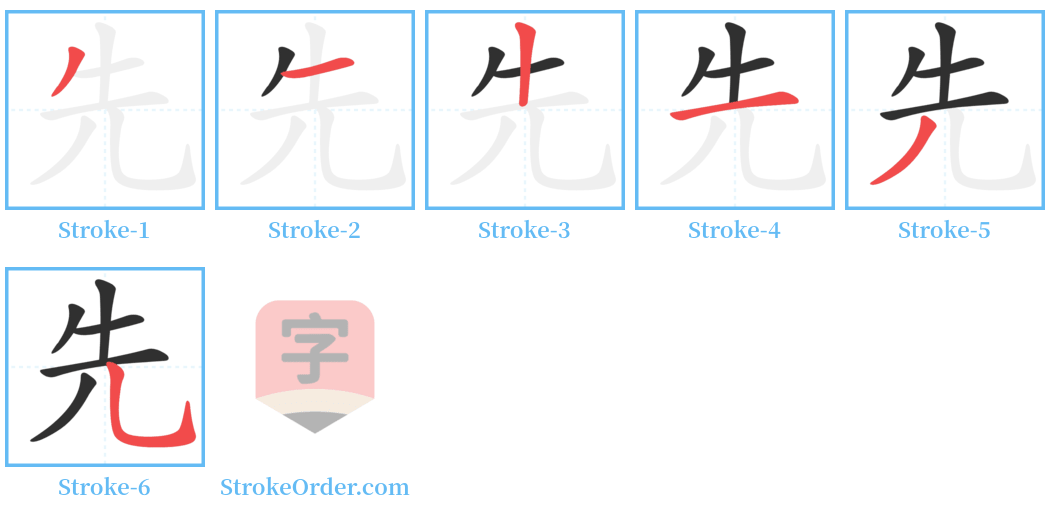先 Stroke Order
Animated Stroke Order of 先

Stroke Order Diagrams for 先

Step-by-Step Handwriting Guide for 先

Learn to Write Chinese Characters with Video Tutorials
Watch the video of writing the Chinese character "先", learn the correct stroke order (笔顺) of the character "先", and master the standard way of writing the character "先".
Free Printable Handwriting Practice with Stroke Order: 先
Printable Writing Practice Worksheet of "先" in Portrait Orientation (Tian Zi Ge)

Printable Writing Practice Worksheet of "先" in Landscape Orientation (Tian Zi Ge)

Information of 先
Pinyin
xiān
Radical
儿
Strokes
6 strokes
Usage
★★★★★
Definition
early / prior / former / in advance / first
先 [xiān]
1. Time is in front, the order is in front, opposite to "后": ~前. ~期. 原~. ~驱. ~河 (In ancient China, emperors would first offer rituals to the Yellow River before the sea, with the river being the source of the sea, referred to the things prompted in advance). ~觉 (jué). ~见之明. ~发制人.
- Time is in front, the order is in front, opposite to "后".
2. An earlier generation or several generations of a family or nation: ~人. ~世 (ancestors). ~民.
- An earlier generation or several generations of a family or nation.
3. A respectful term for deceased persons: ~祖. ~父. ~哲 (referring to deceased talented and virtuous thinkers). ~烈. ~贤.
- A respectful term for deceased persons.
4. Surname.
- Surname.
5. [Verb] (original meaning): to advance, to walk in front.
- [动] (original meaning): advance, walk in front.
6. Character formation: ideogram. Based on oracle bone script, the top part is "止" (foot), and the bottom is "人" (person), meaning the foot has walked in front of the person.
- [造字法]: ideogram.
7. Synonyms:
1. Same as original meaning [En.]: advance.
2. To respect; to attach importance to [En.]: attach importance to.
3. To initiate; to begin [En.]: initiate; begin.
8. [Noun]
1. At first; previously [En.]: first.
2. Ancestors; ancestry [En.]: ancestry; ancestors.
3. Forerunner; pioneer [En.]: forerunner; pioneer.
4. Surname.
9. [Adjective]
1. Front, time or order is in front [En.]: earlier; before.
2. Ancient; previous, predecessor [En.]: old; ancient.
3. Chief; fundamental [En.]: chief; fundamental.
4. Above [En.]: super.
5. Deceased. A respectful term for the dead [En.]: the deceased.
10. [Adverb]
Refers to events or actions that happen earlier.
- Earlier; before.
11. Not exceeding the limits in the manner of advancing [En.]: Not to go beyond due precedence.
- 不当超前而超前.
12. To lead, to guide [En.]: to lead; to guide.
- 领导、率导.
the quick-footed climb up first (idiom) / the early bird catches the worm / first come, first served
Input Method for 先
Pinyin
xian1
Wubi
tfqb
Cangjie
hghu
Zhengma
mbrd
Four Corner
24212
Unicode
U+5148
Same Pronunciation Characters